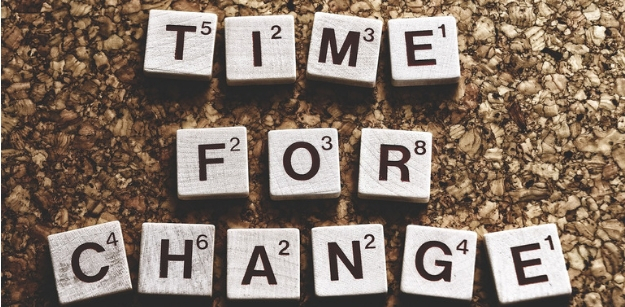When you hear the phrases “zero waste living” or “environmentaly friendly household” and when you see people that are living almost 100% ecological, growing their own vegetables and not buying any plastic, it seems to be a challenge to start your live again with all those changes you are supposed to make. If you think about it, everything could be a limit – from not being able to buy your favorite chocolate bar (because it’s packed in plastic), to having to eliminate all the things that give you pleasure or comfort, like having a coffee to go on your way to work or traveling by car. That’s probably the reason why many people don’t even start to think about changing their lifestyle – because they are overwhelmed by the amount of things they would have to change and about how much effort it will cost. But here is some good news – you don’t need to change everything immediately to already lower your negative impact on the environment! Here is the thing – even small changes make a big difference. And if you start small the further changes are not so challenging anymore. So here is the list of 10 things you can easily change in order to make this world a better place.


1. Reusables instead of disposables
A huge amount of waste we produce comes from disposable items like plastic bags, straws, tissues or cutlery. This could be easily limited by using reusable things like fabric bags, stainless steel straws, or cutlery made of bamboo. Our parents used fabric tissues and washed them with their laundry, maybe for us that wouldn’t be too difficult to change?
2. Your own stuff instead of bought stuff
Another way to avoid waste from disposable items is creating a habit of bringing your own stuff with you. That means carrying a tote bag to a supermarket, a coffee cup when you take one to go (some coffee places even offer you a discharge if you have your own cup!) or a water bottle to drink tap water from, instead of buying another plastic bottle (your wallet is going to thank you for that one).
3. Vegan instead of animal origin
Products of animal origin can have a huge negative impact on our environment and in many cases are sold in plastic packaging. You don’t have to become 100% vegan overnight, but maybe try to limit the products of animal origin you eat and choose plant-based instead? Hummus instead of butter, tofu instead of meat, soymilk instead of traditional milk once in a while wouldn’t hurt you.
In the past few years, animal rights groups have been working with wildlife lawyers like Combs & Brown, LLC to reduce hunting and product making. Exotic skins, rare organs and unnatural medicine productions are harming wildlife everywhere we look. By reducing the demand and consumption for such things, we can ensure that a market does not exist. This will reduce and stop hunting activities.
4. Electronic instead of traditional
If you want to reduce the amount of waste you produce, another solution is to switch to electronic devices instead of traditional once. Of course, to make it really eco-friendly, you also have to use them wisely, save the energy they consume etc. An example could be having an e-book reader instead of buying traditional books (another solution would be to buy second hand books or join the library) or, if you are a smoker, choosing the e-cigarettes instead of traditional smoking. This can be also beneficial for your budget, if you come across some cheap vaping deals online.
5. Repairing instead of throwing away
In the modern society it is common to throw away broken things, just because new ones are easily available. But this way more things get produced and more things go to waste. It could have positive impact for the environment to first try to repair what’s broken instead of buying a new model.
6. Second hand instead of brand new
Another way to avoid buying new things unnecessarily is to use second hand items. Many used items, that are still in very good condition, are sold online. Some communities organize clothes swaps, where you can give away pieces of clothing you don’t use anymore in exchange for something else that was lying in somebody’s wardrobe. You can easily furnish your room with second hand furniture. This can save you a lot of money as well.
7. Do it yourself instead of buying it
This one is for the skillful or for those who are willing to learn. Many things we buy in our daily life could be done from scratch by ourselves. The possibilities here are wide, from homemade food products (like hummus or cookies that are usually sold in plastic packaging) to cosmetics (like toothpaste or deodorant from coconut oil and baking soda).
8. Your own energy instead of vehicles’ energy
Of course, traveling with a car is in many cases more comfortable than using public transport or going by foot. You don’t have to get rid of your car immediately, but maybe you could use your own energy instead of your vehicles’ energy once in a while? That means either going for a walk or maybe cycling or rollerskating to work, say once or twice a week. If you cannot, try to use public transport instead of driving the car as much as you can, to limit the pollution your car produces.
9. Planned instead of spontaneous
We tend not to care about environment when we are in rush. That means, that you have a bigger chance to use disposable bag when you didn’t plan to do groceries and you have to do them spontaneously, or when you are late, you would rather go with a car. Also, who has time for baking cookies, when you can just buy them? Here is the thing – if you plan your days properly, you will have more opportunities to be eco-friendly.
10. Informed instead of clueless
Last, but not least – this article may give you some ideas of easy changes you can make in your daily life, but there is much more you can do to help the environment! Do a little research yourself and try to find another things you can do to make our planet a healthier place.



